








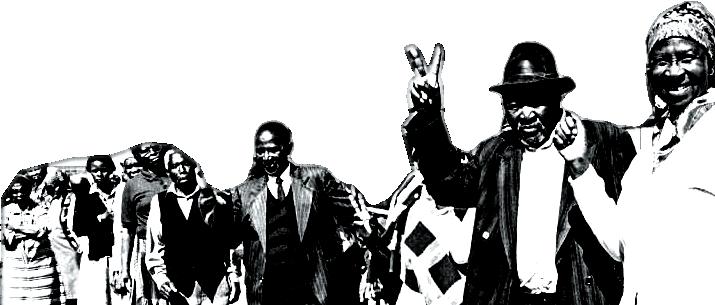
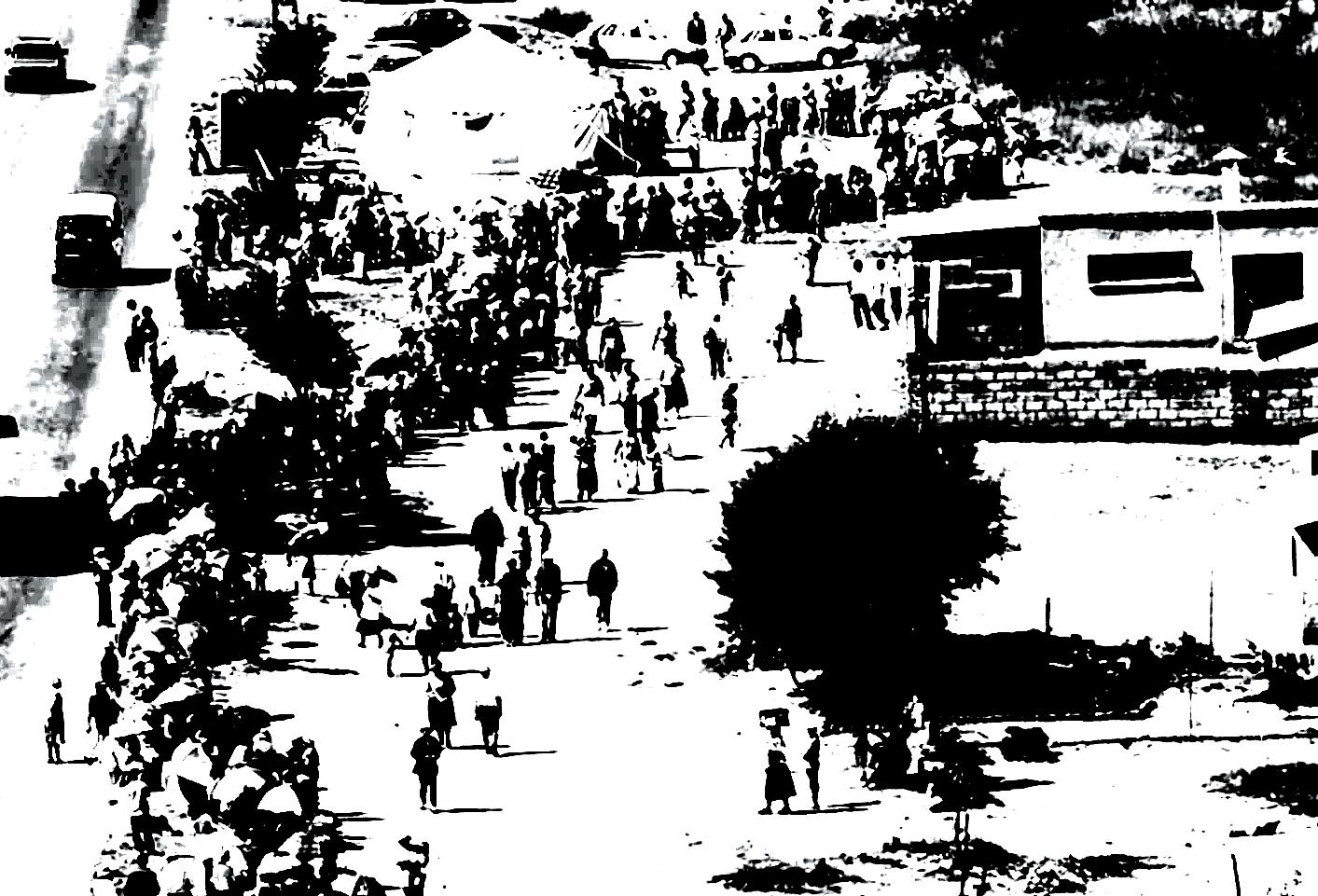

20. MIG Schedule 6B: A beacon of hope for municipalities in South Africa
New approach will revolutionise how Municipal Infrastructure Grants are used to help communities in need
22. Revolutionising SA's municipalities through standardisation
Automating processes key to improved performance and accountability in the Public Service
24. A study into hybrid work arrangements in the Public Service
How did working from home during the COVID-19 pandemic affect recipients of public service?
8. Conversations with leaders
Food security is top priority for Gauteng Social Development, Agriculture and Rural Development MEC Mbali Hlophe
10. Women in the public sector
Teacher of the Year Gugu Qwabe is shaping the minds of South Africa’s future leaders
14. Trailblazer
Professor Hope Magidimisha-Chipungu is making history in the built environment
16. Profiles in leadership
South Africa’s freedom and democracy is a personal fight for South African Human Rights Commission Chair Andrew Christoffel Nissen
18. Office of the President
Never again must the world close its eyes to genocide

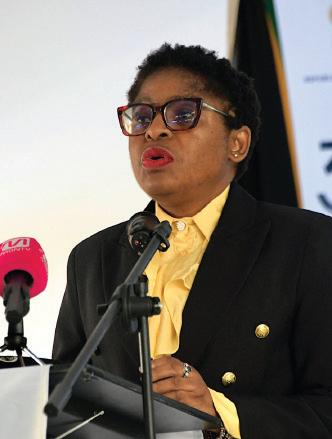
26. SA a better place to live in since 1994 Government has worked hard to improve the lives of South Africans in the past 30 years
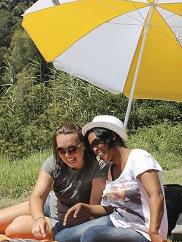
On 8 March 2024, South Africa joined nations across the world in celebrating International Women’s Day under the theme; “Invest in women: Accelerate progress”. In this regard, the year 2024 marks 47 years since the United Nations (UN) officially recognised the day as one to commemorate and celebrate the significant strides achieved by women and the broader women’s movement. Equally, the day is a reminder that we all (across race, class, gender, and sexual orientation) have a responsibility to advance gender equality and its principles across all spheres of society, including the home, the community, the school, the workspace, places of worship and governance institutions.

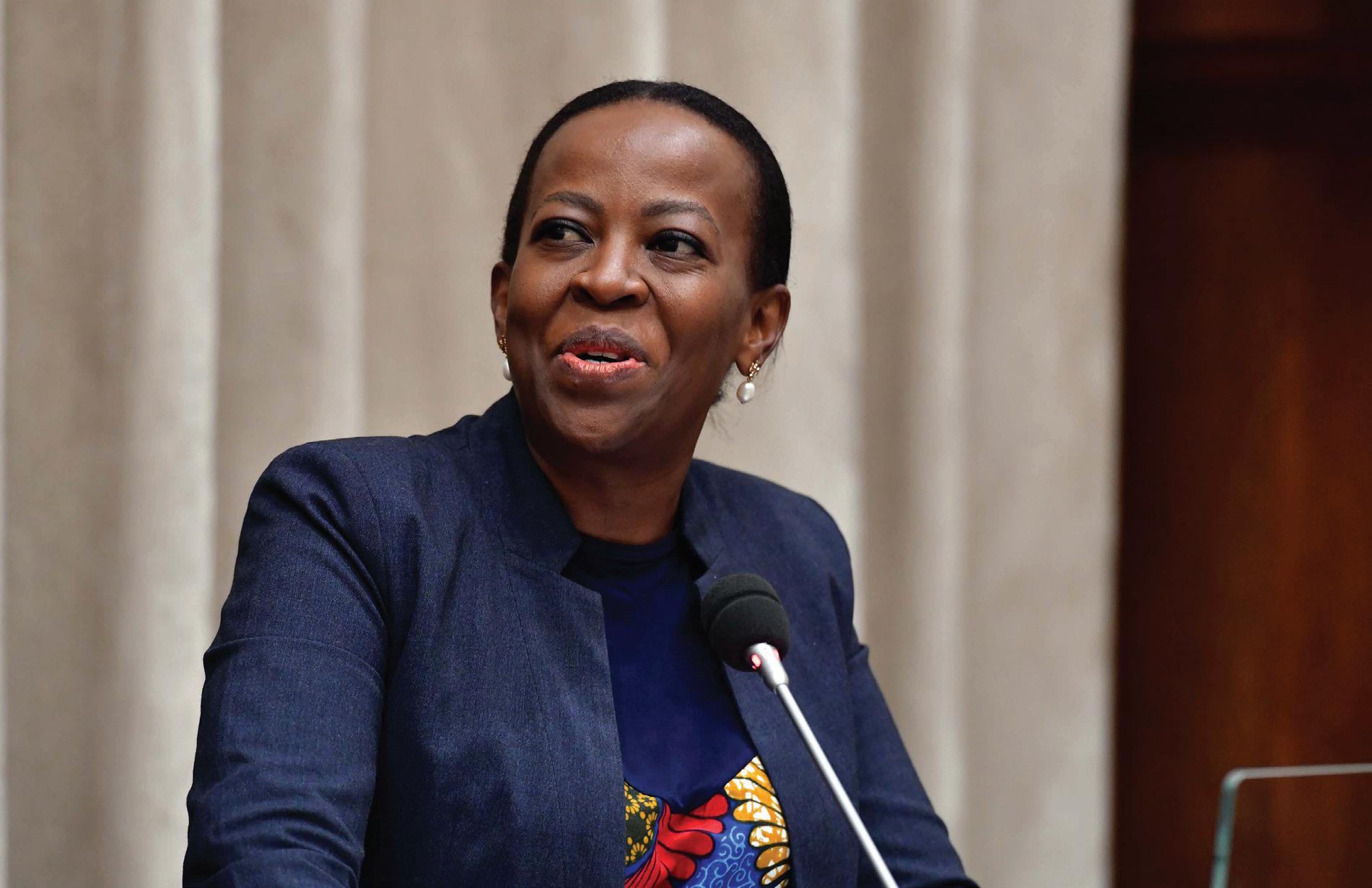
This year is no exception as we amplify our global call for gender equality through the necessary financial, political, social and institutional commitments from all sectors of society. This includes financing for development, thus creating an enabling legislative environment that supports gender equality, the conscious decision to address patriarchal norms and values, and the establishment of institutions to monitor and evaluate the extent to which gender equality is being mainstreamed across sectors.
Equally, 2024 marks 30 years since the advent of democracy
in South Africa. Accordingly, from the dawn of our democracy, our country has placed gender equality as a cornerstone to strengthening our democracy. Our Women’s Charter of 1954 and 1994 respectively has informed the foundation of South Africa’s Constitution on nonsexism and the Equality Clause. This clause has led to a range of social, economic, legal and affirmative action programmes aimed at advancing women’s emancipation and empowerment.
Over the past three decades, South Africa has made significant strides in advancing the agenda for gender equality and women’s empowerment. At continental and multilateral levels, including the African Union (AU) and UN, we have signed and ratified several treaties and instruments aimed at advancing women’s rights, including the Beijing Declaration and Platform for Action of 1995, Maputo Protocol on the Rights of Women in Africa of 2003, and the African Continental Free Trade Area Agreement.
Notwithstanding these strides, more needs to be done to consolidate these gains. We have the collective responsibility of safeguarding our wins on gender equality by establishing women’s institutions across all
state functions and inserting gender equality principles into the legislation as articulated in the AU’s African Charter on Human and Peoples' Rights on the Rights of Women in Africa. Through creating an enabling legislative environment, women are making key strides in traditionally male-dominated sectors, including energy, trade, transport and logistics, and mining, and in emerging economies such as the digital economy and artificial intelligence.
Equally so, freedom and security remain the foundations of gender equality. In the past 30 years, government and civil society have led the call for an end to Gender-Based Violence and Femicide (GBVF). This is supported by the strengthening of the criminal justice system, the implementation of the National Strategic Plan on GBVF and the recent public pledge launched by President Cyril Ramaphosa during the 2024 State of the Nation Address. Our government continues to rally the whole of society to take up the fight against GBVF and ensure the protection of women, children, and other vulnerable groups. This is more pressing for working class and poor women.
Our government aims to systematically address the barriers to gender equality by investing
in increasing access to basic services such as water, electricity, housing and free health care for the poor. Additional socioeconomic provisions include increased access by girls and women to primary, secondary and tertiary education.
The constitutional vision of a non-sexist society and gender equality is underscored by women’s economic empowerment. Government continues to provide targeted support and interventions to women enterprises to accelerate the sustainable participation of women in the mainstream economy, including more affordable, usable, and responsive finances for women, development programmess to prepare women for positions on the boards of public and private entities and mobilisation strategies for women farmers in agricultural cooperatives.
The ultimate goal is for women to develop sustainable enterprises that contribute to the country’s gross domestic product, employment, equity, and economic transformation to give women equal access to and control over economic resources.
It would be recalled that in 2020, President Ramaphosa pronounced preferential procurement to accelerate the empowerment of women, youth and
persons with disabilities in business. This is a strategy mapped out by government to allocate 40% of all procurement spend in the public sector towards businesses owned by women. In this context, the President has set the precedence, now we need the whole of the public and private sectors to follow and lead in the capacitating of women-owned small and medium enterprises.
As we commemorate South Africa’s 30 years of democracy and freedom, let us not trivialise the hard-earned gains of women under this dispensation. Instead, we must ensure gender equality remains a key feature of sustained development and democracy.
Together we can promote gender equality and build the Africa we want, where women are contributors to the development of our continent.
In the words of the former President of Liberia and Africa’s first democratically-elected woman President Ellen Johnson Sirleaf;
“The future belongs to us because we have taken charge of it. We have the commitment, we have the resourcefulness, and we have the strength of our people to share the dream across Africa.” ❖
Thirty years into democracy, public servants remain at the forefront of protecting and prioritising the human rights of our citizens through ethical and efficient service delivery.
Last month, we celebrated Human Rights Month under the theme; “Three Decades of Respect for and Promotion of Human Rights”. We, as public servants, should keep in mind that we are responsible for the fulfilment of these rights. Let us uphold and administer the Constitution, deepen constitutional democracy, and continue promoting the values of human dignity, equality and the advancement of human rights and freedom.
One way of ensuring that we uphold human
rights is through fighting corruption. While government is committed to eradicating corruption by 2030, South Africa scored 41 out of 100 in the Corruption Perception Index (CPI) released in January 2023. The index showed South Africa as one of 23 countries that stumbled into the category of flawed democracies.
To reverse the country’s CPI score, the country commenced with implementation of the recommendations from the State Capture Commission, and is strengthening the National Prosecuting Authority (NPA), a bill is before Parliament and allocation of resources is being considered amongst other important activities.

During the 2024 State of the Nation Address, President Cyril Ramaphosa noted that while state capture caused damage to our democracy, South Africans, including many
honest and dedicated public officials, fought back and worked together to avert what could have been a bigger damage.
Government continues to strengthen the fight against corruption. The Special Investigations Unit (SIU), a critical component in the fight against corruption is hard at work. In its 2023/24 Annual Report, the agency reports that it has recovered R436 million in money and assets, R5.9 billion in potential cash and securing commitments in the form of acknowledgement of debts from various service providers, that the State lost due to corruption.
In addition, the Special Tribunal, which has a statutory mandate to
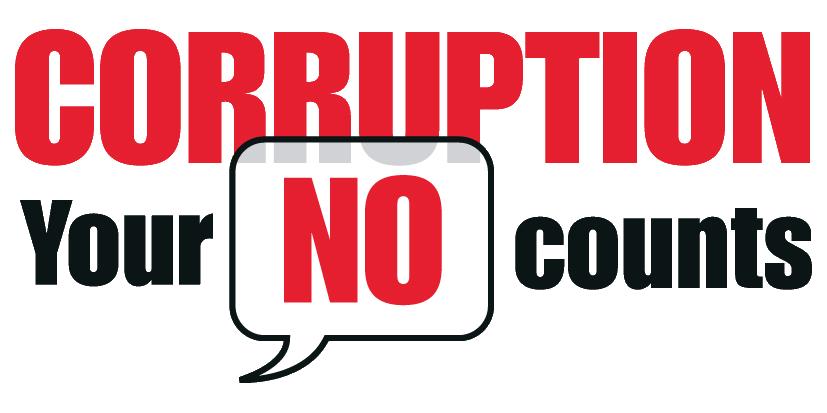
recover public funds syphoned from the fiscus through corruption, fraud and illicit money flows, ensures that SIU cases are resolved faster. In just three years, 54 cases have been lodged with the contract value of R9.9 billion.
The NPA has established an investigating directorate to fight corruption and other serious crimes. Great progress has been made in bringing those responsible for state capture to justice with more than 200 accused persons prosecuted and more under investigation.
Freezing orders of R14 billion have also been granted to the NPA’s Asset Forfeiture Unit for state capture-related cases, and
around R8.6 billion in corrupt proceeds have been returned to the State.
As public servants, we are expected to continue with the trajectory of leading by example, embedding sound governance and controls, and rooting out corruption in the work we do. This can be done by building capability for effective management and retaining people with scarce and critical skills, thereby strengthening the State’s employee value proposition and shift the culture of the public sector.
Restoring the rights of South Africans and ensuring adequate services are delivered remains key. To this effect, government is
committed to end load shedding. Plans include gaining substantial new power through private investments, implementing a major debt relief package to enable Eskom to enhance maintenance and transmission infrastructure, and connecting more than 2 500 megawatts of solar and wind power to the grid with the Renewable Energy Programme.
Efforts to secure water supply and diversifying water sources are underway with bulk water projects under construction across the country. This aims to improve water supply, providing clean drinkable and reliable water to millions of residents in villages, towns and cities.
Social grants reach almost nine million unemployed people every month, restoring their dignity and ensuring that their rights to access basic services are met. These grants and subsidies do much more than give people what they need to live –with some beneficiaries having used them to start businesses. These grants are an investment in the future, especially given that a huge number of beneficiaries are children.
As we celebrate 30 years of democracy, we must adhere to the Constitution and its promise of a better life, and fulfil government’s commitment of leaving no one behind. ❖
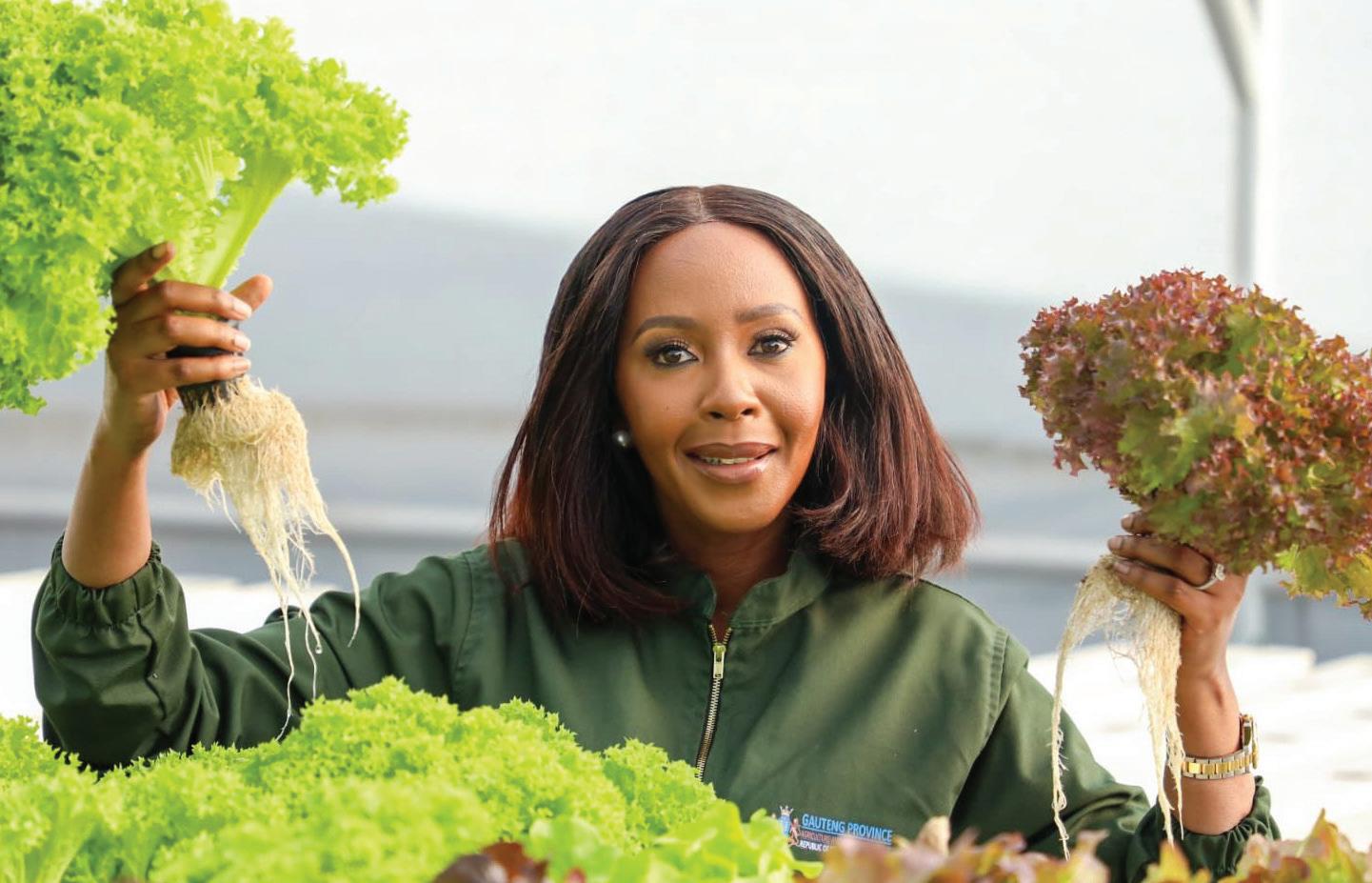
There was no trepidation when Gauteng MEC for Social Development, Agriculture and Rural Development Mbali Hlophe was, in 2022, tasked with being the political
custodian of the two departments.
On the contrary, embracing the immense primary task of ensuring food security, she laced up her bootstraps and hit
the ground running. In her previous portfolio as MEC for Sport, Arts, Culture and Recreation, she was the torchbearer of the happiness index in the country’s most
industrialised province.
Reflecting on the switch during a wide-ranging interview with the Public Sector Manager magazine, she said: “For a lot of people, the departments
of Social Development and Agriculture have always been seen as boring and dull. When I started, a lot of people said, ‘But you are young, you were a better fit at sport, how will you cope with this one?’”
She said Gauteng Premier Panyaza Lesufi understood that to change how the departments were perceived, they needed to do things differently. “[He] said ‘Because I want to see greater progress and want you to really run, bring your youthful exuberance and take these departments to the next level".
According to Hlophe the decision to combine the two departments into one ministry was to ensure that the provincial government fast-tracked its developmental agenda.
She explained that when she took over the reins, an analysis was conducted on the Department of Social Development’s food parcel programme, which she said was at the time “unsustainable”.
“We found an error in the model that was being utilised. When you compare the work that we do and the investment that is done, we have poured lots of money but we are not seeing poverty levels going down. That means that there is
something fundamentally wrong in the strategy,” she explained.
The province’s food support programme targets poor families, pensioners, child-headed families and homes where breadwinners are ill or incapacitated. It provides food parcels and food-growing starter packs to these families. The programmes also supports leaners with school uniforms and study material.
While the Gauteng Department of Social Development’s target for the sixth administration was to reach over two million foodinsecure people by 2024, it has since surpassed that number.
A total of 98 106 individual beneficiaries produced their own food through the initiatives of the Gauteng Department of Agriculture, Rural Development and Environment, ensuring that the food security programmes reach more people.
In 2023, the Department of Social Development embarked on two expansion plans for food relief, where the target of community nutrition and development centres moved from 2 588 and reached 28 716 beneficiaries.
Hlophe explained that they realised that in order to meet

the huge food demand, they needed to change their strategy. Instead of only giving people food parcels for three months, they also added seed packages for the families to produce their own food.
This way, she said, the department is able to provide food to the vulnerable in a “sustainable manner".
A 2021 Gauteng City-Region Observatory survey revealed that food insecurity in the province stood at 52%, which equates to about 8.3 million people, inclusive of severe and moderate food-insecure individuals. However, the food relief
initiatives from the two departments have reached 4.6 million individuals..
Honing in on the topic of food sustainability, the province continues to post impressive figures.
Since 2019, the province has supported 32 383 subsistence farmers. Beyond this, 21 209 school, homestead and food gardens as well as urban farms were established in townships, informal settlements and hostels.
The MEC said the departments have a green army of 6 000 individuals that help communities by teaching them about backyard farming.
“Many people believe that

you need vast pieces of land to farm, but you do not. We really just show them that with even just a small piece of land –even if you live in a shack – we show that you can even use a [tyre] or box to plant to supplement the food parcel that you receive. It is more sustainable and it develops people’s lives. Nobody likes to live on handouts,” she emphasised.
Hlophe said the provincial government would soon launch a farm-yard project that will transform the traditional concept of spaza shops, an economy that she said had in recent years been overtaken by foreign nationals.
She said while farming land was mostly distributed by the three spheres of government, the provincial government
was largely constrained in this regard.
“We do have some land parcels but we are quite limited because of our land mass. A lot of our provincial land parcels have been taken over by informal settlements,” she said. She added that the project will ensure that land is distributed to historically disadvantaged people and enable them to venture into farming.
“It is really about changing the face of agriculture and being able to provide food security for the country," she added.
Hlophe said while there were some challenges, the programme has had many success stories.
“What I appreciate the most is that I am seeing a lot of
young black women getting into farming,” she explained.
Reflecting on the country’s 30 years of democracy, the MEC said while three decades may sound like a long time, for some people, it was not the case.
“It is actually not if you consider the hundreds of years of oppression. You are literally trying to build on and fix overnight hundreds of years of oppression and segregation of the majority,” she contextualised.
In 30 years, government had to “flip that on its head”.
“If you look at the population in 1994 and what we have now, it has quadrupled. So, there is a depletiion of resources and
people do not seem to have an appreciation of this. If you look at the energy crisis, albeit the issues of maintenance, it is because we have a lot more people on the grid. The same applies to water and a number of other resources,” she said. She lauded government for the work done to transform South Africa in both the private and public sectors.
“We have a lot more black[s] in senior management, we have a lot more prominent businesspeople, there are a lot more opportunities open and we have been able to increase education levels in the country if you consider where we come from. There is a lot more that people can celebrate,” she reflected. ❖


As a minor, Gugu Qwabe dreamt of following in her mother’s footsteps and become an educator.
As fate would have it, the 40-year-old was eventually able to segue into the noble profession, despite her mother’s initial apprehension. Today, the ambitious educator is grabbing the attention of the country’s decision-makers with her lessons in the backwaters of KwaZulu-Natal.
Qwabe teaches English and social sciences at the Mandla Mthethwa School of Excellence in KwaMhlabuyalingana. In October 2023, she scooped the Teacher of the Year Award at the Department of Basic Education (DBE)-organised ceremony.
“I am a child of a teacher. Initially, my mother did not want me to become an educator, despite it being
something I have always loved. Even as a young girl, I would imitate being a teacher under a tree or in front of a mirror,” she said. Unable to clear the hurdle of convincing her mother that teaching was a career she wanted to pursue after completing high school, Qwabe enrolled for a degree in psychology at the University of KwaZuluNatal.
“In psychology, after obtaining a junior degree, you need a PhD (Doctor of Philosophy) to make career progress. You cannot really secure a proper job with just a junior degree. Because my mother could no longer afford my university fees, I somewhat found my way to education – proudly so,” she chuckled.
In 2018, she was recruited to the Mandla Mthethwa School of Excellence, when it first opened its doors.
“Our school gets a lot of attention because as much as it is in a deep rural area, it is extremely well equipped,” she said.
Amid all the frenzy around the school, Qwabe was introduced to the National Teacher Awards – one of the ways in which the DBE acknowledges the extraordinary efforts made by teachers, often in very difficult conditions –to provide a better future for learners. Qwabe said it was during this process that she was introduced to policy formulators from national and provincial departments of education.
Published author
As a published author, in her book; Applying Ubuntu Principles to Think, Learn and Succeed, she narrates stories of former leaders – Former President Nelson Mandela, former
Home Affairs Minister Prince Mangosuthu Buthelezi and many other leaders that teach learners about good values that they could also apply in their daily lives.
Qwabe has since created a textbook and a teacher guide that talks to this.
“I met policymakers through the competition and we talked about how we could inculcate these values. There are a lot of issues in the education system – uninspired learners and learners with a lot of psychological problems. In the book, I have a section that deals with these. It narrates stories about people who have survived these challenges.
At the awards, she was honoured for imparting the values of ubuntu as an extracurricular activity to learners at the school.
“I did not have any expectations of winning the competition, I just needed an audience with these policymakers,” she said.
For the 2023 matric exams, her school was ranked first in the quantile one schools in the country. It was the overall best school in KwaZulu-Natal in the same year. From its 93 matriculants, 90 passed. Overall, the
school obtained 226 distinctions. Above this, three learners each obtained eight distinctions. Another two obtained seven distinctions.
“Almost all of them got Bachelor passes. Only two of our learners obtained diploma passes,” she beamed. “We are known for quality results and motivated learners. That is why I said my intention was to go to the department and say, ‘look, we are doing it, how about you adopt’,” she explained.
The concept, she said, was inspired by Arnold Zulman, a former friend of former Presi-
dent Mandela. Zulman is the businessman behind Beacon Sweets.
“He inspired me. I sat down with him and he narrated stories of Mandela and Buthelezi and how he used to mediate when the two were in conflict,” she recalled. “He is a good friend of mine now and we meet up whenever he is in South Africa.”
Qwabe is so committed to the course that she says she spends a lot of time studying neuroscience journals so she can be able to empower learners psychologically. She says
these lessons help the respective learners deal with trauma and “real issues”.
“We attract learners from as far as Durban and Johannesburg now. Even if a child does not come from a poor background, they come from a broken family or a family dealing with alcoholism,” she added.
Qwabe's aim is to produce leaders who share the values she teaches.
“I wanted leaders who are accountable. When I teach them, I tell them that in them I see great leaders who will help people,” she concluded. ❖


housing at the University of KwaZuluNatal (UKZN).
In 2023, she became the first black woman in South Africa to obtain a full professorship in the discipline of town and regional planning.
“I have mixed emotions regarding my recent promotion to the position of full professor. On one hand, I am filled with happiness and a sense of accomplishment, as I have finally reached the goal I have been working towards for a significant period of time,” she explained.
Breaking barriers in any professional environment requires a lot of resilience and dedication, more especially for women who are game-changers in male-dominated professions.
Attesting to this, Professor Hope Magidimisha-Chipungu says at the onset of her career, she confronted significant resistance from her counterparts, but this motivated her to persist and strive to alter the status quo.
“Despite facing challenges related to age, gender and skin colour, I chose to remain steadfast in my aspirations. My educational and career journey has been a dynamic and transformative one, shaped by a series of challenges that ultimately propelled me forward,” she explained.
Magidimisha-Chipungu is a professor and academic leader for town and regional planning and
However, on the other hand, there is a realisation that there is a considerable amount of work lying ahead.
“It is disheartening to acknowledge that it has taken nearly 30 years postapartheid for South Africa to produce a black female South African-born professor in town and regional planning. This lack of diversity and representation within academic positions is a concern that must be addressed and corrected,” she said.
In her leadership role, she oversees a team of more than 12 staff members and nearly 500 students. She conducts lectures for honours and master’s students in town and regional planning. She supervises academic research for master’s and PhD students, as well as post-doctorate research fellows.
Her administrative and management responsibilities extend to university structures such as the Senate, the College Institutional and Staffing Forum, and other committees.
In 2015, she made history as the first black female South African to gradu-
ate with a PhD in Town and Regional Planning at the UKZN.
Her academic foundation includes a Master’s in Town and Regional Planning and a Degree in Geography and Environment, both obtained from the UKZN. Additionally, she holds a Diploma in Project Management.
Throughout her career, Magidimisha-Chipungu has been recognised as an award-winning academic, being named among the 2018 Mail & Guardian Top 200 Young South Africans and receiving the Teaching Excellence in the College of Humanities award from the UKZN in the same year.
“I have also been awarded the Vice Chancellor Research Award and featured in the top 10 publishing researcher at the UKZN. My research and publication record is extensive, spanning the authoring and co-authoring of numerous book chapters and peer-reviewing of journal articles, demonstrating my commitment to academia,” she explained.
Magidimisha-Chipungu’s educational and career journey includes undertaking various roles in public institutions, including working as a researcher at the Human Sciences Research Council.
In 2020, a pivotal departure occurred in her career journey
when she assumed the position of the South African Research Chairs Initiative Chairperson
“It is disheartening to acknowledge that it has taken nearly 30 years postapartheid for South Africa to produce a black female professor in town and regional planning."
(SARChI) for Inclusive Cities at the UKZN.
“I was the youngest person to ever assume the chairship at the organisation. This is a significant role held within the framework of the UKZN, National Research Foundation and the South African Cities Network.
“The foundation of this chairship is rooted in the recognition
that traditional dimensions of the inclusive city often overlook vulnerable segments of society, such as women, children and the aging population, as well as minority clusters like the individuals living with disabilities and migrants,” she explained.
Moreover, it acknowledges the escalating spatial inequality driven by racial and class differences, contributing to increased community violence and protests.
As the SARChI Chair, her focus encompasses specific domains, including women and children, people living with disabilities, migrant, and the race and class domains.
“Through this role, I delve into these dimensions to foster a more comprehensive understanding of inclusivity and address challenges faced by these marginalised groups, contributing to the broader discourse on inclusive urban development,” she explained.
At the core of the SARChI chair project is the focus on climate change and natural disasters.
“I spent a great deal of time understanding and researching how cities are governed and run with keen interest on post-disaster [management]," she said.
Internationally, she contributes as a scientific committee member for the International Society of City and Regional Planning, co-directing workshops for
young professional planners in South Africa.
She is also one of the key advisors for the Housing Project in Malawi, with involvement in projects spanning Mozambique and Zambia.
Notably, she was part of the project on the 24-hour City funded by University of Politecnico di Milan, the Department of Architecture and Urban Studies in Florence, Italy, highlighting her global engagement in urban planning initiatives.
“Throughout my journey, the unwavering support of my husband and my resilience have been instrumental in overcoming challenges and achieving success,” she said.
Over and above her amazing work, Magidimisha-Chipungu is also a National Planning Commissioner in The Presidency.
She works together with other commissioners to provide strategic direction and guidance for the country's long-term planning and development.
“The South African National Planning Commission plays a crucial role as an advisory body to government, formulating and implementing long-term development plans, offering policy advice, monitoring progress, promoting collaboration, engaging the public and reporting to the President,” she explained. ❖
South African Human Rights Commission (SAHRC) Chair Andrew Christoffel
Nissen has reminded South Africans that the country’s freedom and democracy did not fall from the sky, and that it is everyone’s responsibility to protect this hard-earned liberation.
“Men and women paid with their lives for us to enjoy our freedom and democracy today. I am lucky to be among those who survived when many South Africans were killed during apartheid while fighting for our country’s freedom.
“The rights and freedom that we enjoy today are precious because they were bought with blood and sweat. Let us show appreciation and make it our responsibility to protect our freedom and democracy,” he said.
Nissen’s tenure as Chair of the SAHRC does not come as a surprise as he has spent most of his life fighting for human rights. He has worked for various civil society organisations and faith-based organisation as a human rights activist during apartheid and beyond.
Nissen holds various qualifications in Theology and Religious Studies. As part of his activism, in the 1980s and 1990s, he did extensive work as a community organiser in communities such as Graaf Reinett, Eerste River Advice
Office, Macassar, the then Die Bos (now named after him as Chris Nissen Park) and Sir Lowry’s Pass Village.
He supported communi ties in addressing various challenges they were facing, including hous ing and access to land. Due to his work, Nissen has been honoured by having streets and a school in Knysna named after him.
After years of ecumenical, com munity and political organisation-based work, Nissen was appointed as a member of the Western Cape Provincial Legislature, served as Deputy Speaker in the province, served as West ern Cape MEC for Economic Affairs and was National Coordinator of the Masakhane Campaign for the Department of Constitutional Develop ment in the same province.
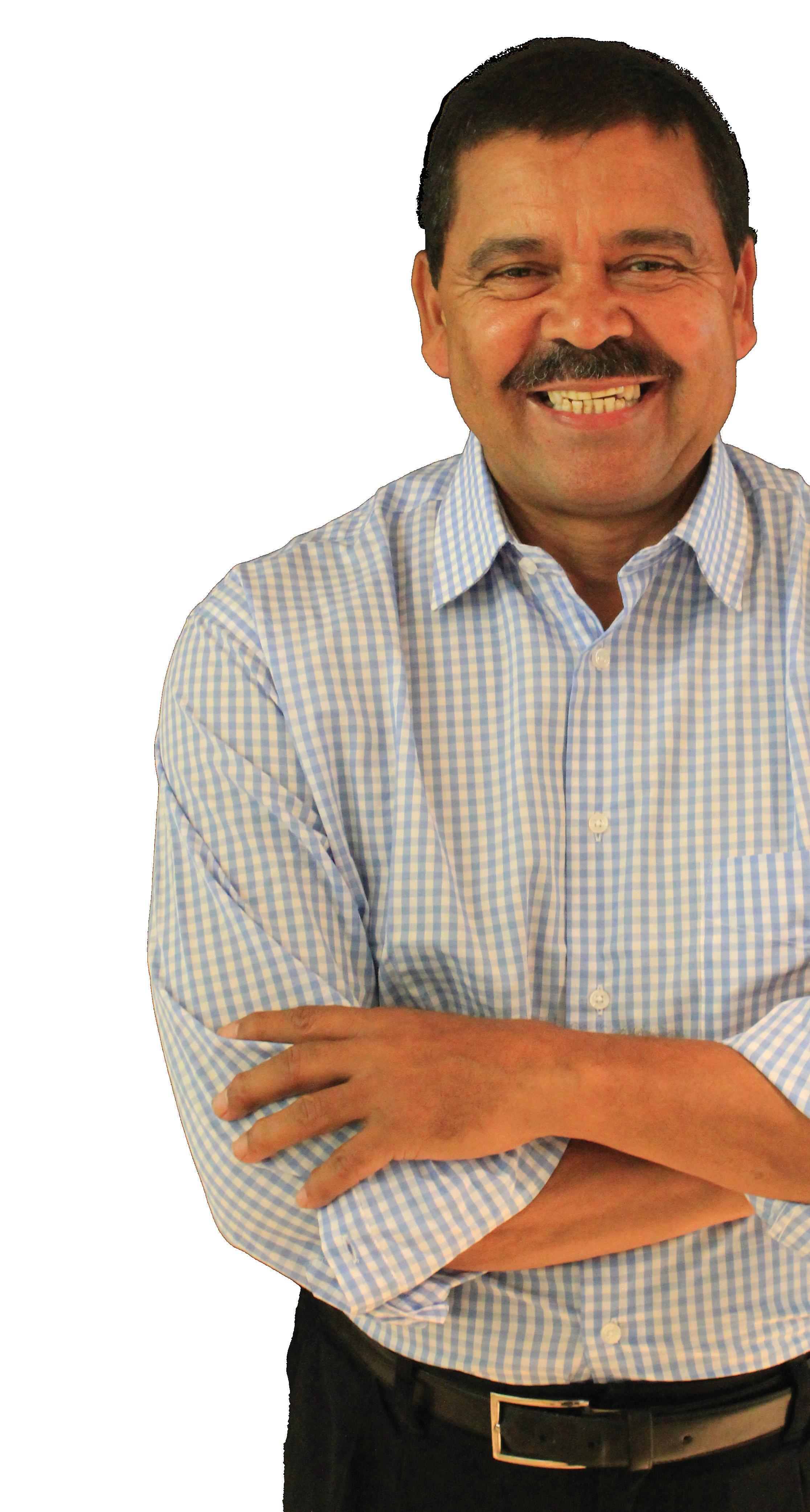
“I have worked all over the country, and I am blessed to be one of the living South Africans who have two streets, a community and a branch of the African National Congress named after them,” he said.
Nissen joined the SAHRC in 2017 as a part-time Commissioner until December 2023. He realised then that his job was far from part-time as it required him to carry expectations and the hopes of many citizens, especially the most vulnerable people in the country. As such, he resigned from all his other duties, including serving on several boards as a member.
“It is humbling to know that you are entrusted with fighting for the rights of the most vulnerable people, and I am really honoured to have started working for the commission on that basis,” he explained.
In his current position, Nissen acknowledges that he is not a boss but a fellow activist for human rights.
“My responsibility is to defend the organisation and ensure that there is proper and good governance. I work closely with the commissioners to provide leadership to the entire staff at the SAHRC to promote, monitor
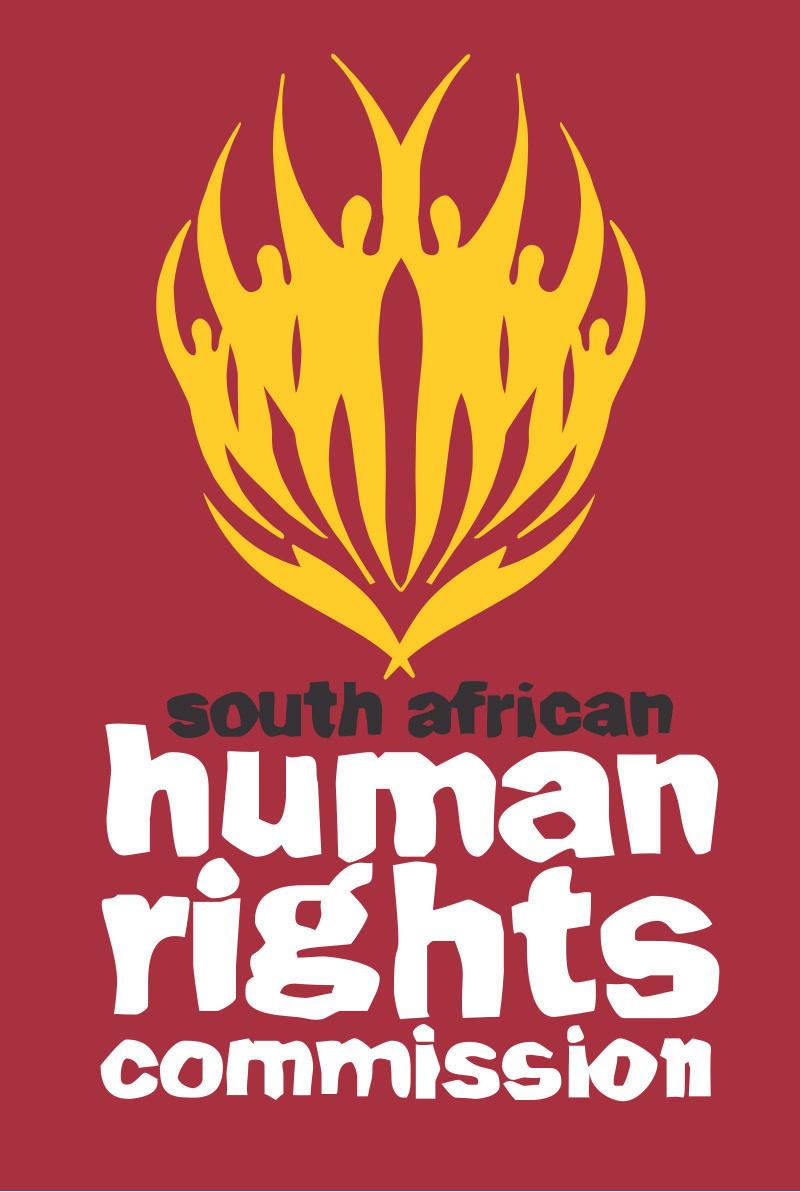
and protect the human rights.” He also plays a huge role in ensuring that funds used by the commission to carry out its mandate are accounted for and that its work has impact on citizens’ lives.
“I was among activists who were tortured and imprisoned during the liberation struggle, and it means a lot to me that I now get to serve the country through the SAHRC. I am very grateful because I am the voice of the people and the conscience of government,” he added.
As an activist who contributed to the liberation of the country and lives to see the transformation and progress made over the past 30 years, he reflects on some of his experiences pre- and post-apartheid.
“Although South Africa still has a lot of challenges, I believe that
the country has progressed well over the years. I implore everyone to play their part towards the advancement of our country.
“If we are not optimistic about our country, we will never be optimistic about wherever we go. We need to be positive and energetic so that we can address the challenges that we are facing as a country,” he said.
The Chair said the commission has increased efforts to collaborate with civil society and government to change human behaviour because social ills, including domestic violence, gender-based violence and femicide and other crimes happen in communities, adding that government cannot combat these alone.
To overcome these challenges,
he encouraged everyone to build on good citizenship, respect the Constitution and each other regardless of race, ethnicity, gender, culture or religion.
“We are all South Africans and we all have rights, but they come with responsibilities. We all need to behave responsibly. Use your vote, but use your voice as well. Our elective representatives also have to communicate with and be accountable to the people,” he said.
He urged public servants to be dedicated to their duties and ensure that relevant services are rendered to South Africans.
“You cannot have people waiting in queues for hours to get the services that they need, and you should not treat people as though you are doing them a favour. It is your job. Do what is right,” he added.
The SAHRC is one of the Chapter Nine Institutions established in terms of Chapter 9 of the Constitutions to guard and strengthen the country’s democracy. Its mandate includes raising awareness on human rights issues, monitoring and assessing the observance of human rights, educating and training citizens on human rights, address human rights violations and seeking effective redress. ❖
Thirty years ago, in the space of just a hundred days, one of the worst mass murders in recent times happened on African soil.
Approximately 1 million men, women and children were slaughtered within a period of 100 days in Rwanda in an orchestrated campaign of violence that involved organs of state, civilians, militias, the local media and even churches.
The Rwandan genocide was one of the darkest chapters in human history. It was an

atrocity that unfolded as the world looked on and failed to act. There was little intervention from the international community.
Despite a warning from the head of the United Nations (UN) deployment stationed in Rwanda at the time that a mass extermination of Rwandan Tutsi people was imminent, the UN peacekeepers failed to prevent the killings, arguing that their mandate was limited and that they lacked authority to intervene.
Instead, the peacekeepers
were ordered to focus on evacuating expatriates desperate to flee the country.
The first big massacre of the genocide was at a school in the capital, Kigali, which was being guarded by UN peacekeepers. Just hours after the UN troops withdrew, the feared Interahamwe militias stormed the school and killed 2 000 people who had sought shelter there hoping the UN would protect them.
Several western countries, some of which had a presence in Rwanda at the time,
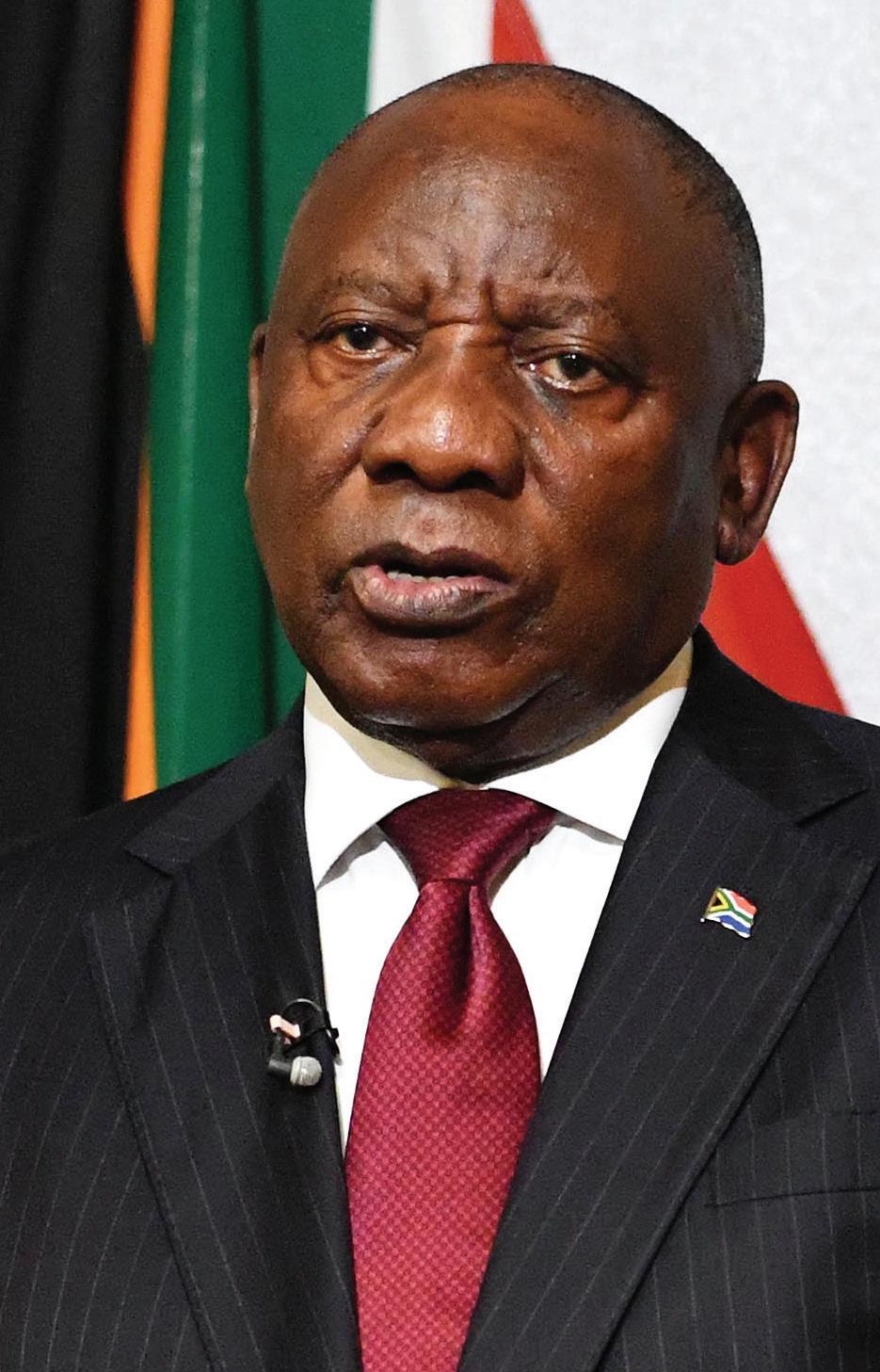
would later say they were not aware of the extent of the killings. Thirty years later, no country or international body can any longer say ‘we didn’t know’ and use that claim as justification for a failure to act.
The advent of 24 hour news, the proliferation of social and community media and the speed with which information is disseminated in the digital age makes it nearly impossible for mass atrocities to occur under conditions of secrecy.
At the numerous Rwandan genocide 30th commemoration memorials, one finds the words ‘Never Again’.
This phrase, ‘Never Again’, also appears on memorials to the Nazi holocaust, and is evoked as a reminder to the world of the horrors perpetrated by humankind and of the collective responsibility we share to ensure that this dark history does not repeat itself.
The holocaust survivor Elie Wiesel has called the phrase “a prayer, a promise, a vow, never again the glorification of base, ugly, dark violence”.
It is because of our stated commitment to never again allow atrocities of this kind, that the world cannot stand idly by as another genocide is carried out, this time against the people of Palestine in the besieged Gaza Strip.
Nobody can claim ignorance about what is happening in Gaza, because, unlike in Rwanda in 1994, these atrocities are being televised, written about, tweeted and live streamed.
It is now close to six months since Israel unleashed a campaign of violence on the people of Gaza in response to the atrocities committed by Hamas.
More than 32 000 Gazans have been killed. According to the UN Children’s Fund, approximately 13 000 of these casualties are children. Civilians, non-combatants, women, persons with disabilities, journalists and even aid workers have not been spared.
Late last year, South Africa instituted proceedings against Israel at the International Court of Justice (ICJ) in The Hague for violating its obligations under the Convention on the Prevention and Punishment of the Crime of Genocide, with respect to its actions in Gaza.
The ICJ, the principal judicial organ of the UN, pronounced on a set of provisional measures that Israel should take to prevent the commission of all acts falling within the scope of the Genocide Convention. The court directed Israel, among other things, to ensure that its military does not commit such acts, to prevent and punish the direct and public incitement to commit genocide, and to enable the provision of
urgently needed basic service and humanitarian assistance to the people of Gaza.
In clear defiance of this legallybinding order, Israel has intensified its violence against the residents of Gaza. These people are now also facing starvation and famine as the delivery of aid continues to be disrupted, including the killing of humanitarian and aid-workers.
Recently, the ICJ issued additional measures, ordering Israel to take the necessary and effective measures to ensure ‘unhindered provision at scale’ of basic services and humanitarian aid to the people of Gaza. The court accepted South Africa’s argument that, contrary to what Israel claimed, the UN agencies are not being assisted to get aid flowing into Gaza.
The court also ordered Israel to ‘ensure with immediate effect that its military does not commit acts which constitute a violation of any of the rights of the Palestinians in Gaza as a protected group’ under the Genocide Convention.
When the Rwandan genocide unfolded in 1994, the Genocide Convention had been in existence for nearly half a century, having been adopted in 1948 in the aftermath of the Second World War.
In spite of this, the atrocities in Rwanda did not just happen, but
were allowed to happen in the face of callous indifference by the international community.
It was only several decades later that a number of these ‘bystanders to the genocide’ apologised for failing to act as the killings happened. As they were for the families of those who perished in the Rwandan genocide, for today’s genocide victims, apologies are too little, too late.
It should never be, and must never be, that atrocities, gross human rights violations and genocide should somehow carry less weight because of the race, ethnicity or religious affiliation of the victims.
We owe it to the victims of all the world’s genocides to not betray their memories by looking away, by failing to act, or worst of all, by claiming we didn’t know.
The terrible events in Rwanda in 1994 took place in the year we as South Africans attained our freedom.
We are ever mindful that with that freedom comes a responsibility to work for peace, justice and human rights everywhere. It is a duty and a standard we will continuously strive to uphold, not just for ourselves but for all peoples, everywhere. ❖
*This President’s message was first published on 8 February 2024.

Infrastructure, like the circulatory system of a living organism, is the vital network that sustains the life and vibrancy of any thriving society. It manifests in a multitude of forms, including roads that connect distant corners, bridges that span natural obstacles, water supply systems that quench the thirst of communities, sanitation facilities that safeguard public health and energy grids that power progress.
Access to basic amenities such as water, sanitation, electricity and transportation is a fundamental right that enhances the quality of life and fosters human dignity. It is important to note that efforts, particularly by municipalities, to establish and maintain robust infrastructure is not merely a lofty goal but is an imperative – a fundamental necessity in fostering inclusive development and meeting the diverse needs of South Africans.
In a significant move towards fostering inclusive development, the implementation of Municipal Infrastructure Grants (MIG) Schedule 6B is proving to be a game-changer for municipalities in South Africa. Aimed at addressing historical challenges in infrastructure development, this innovative approach is set to revolutionise how MIG funds are utilised, ensuring they reach communities in need and uplift the lives of citizens.

Infrastructure development, encompassing roads, bridges, water supply, sanitation, energy, and more, is recognised as the lifeblood of progress, prosperity, and sustainability. For South African municipalities, the pursuit of robust infrastructure is not just a goal; it is crucial for fostering inclusive development and addressing the diverse needs of the people.
The challenges faced in municipal infrastructure development, such as under-expenditure, inappropriate expenditure, and insufficient funding for maintenance, have been persistent. These challenges have resulted in unreliable infrastructure and hampered service delivery, im-
pacting the lives of communities.
The MIG 6B implementation addresses these challenges. It ensures that communities facing perennial under-spending receive the services meant to be delivered through MIG funding. Previously, unspent funds from under-performing municipalities would have been reallocated to others, but now, with MIG 6B, support is directed to municipalities as envisaged in Section 154 of the Constitution.
The Department of Cooperative Governance, committed to upholding constitutional tenets in pursuit of a developmental state, plays a crucial role in this support mechanism. The MIG implementation actively tackles
the legacy of apartheid by eradicating basic service backlogs, as evidenced by the positive progress reported in the Census 2022.
Despite the achievements, challenges persist, including under-expenditure, inappropriate expenditure, and poor maintenance of existing infrastructure. The implementation of MIG 6B is a strategic step towards overcoming these challenges and ensuring effective utilisation of funds for the benefit of communities.
To further ensure success, Cooperative Governance and Traditional Affairs Minister Thembi Nkadimeng and Deputy ministers Parks Tau
and Zolile Burns-Ncamashe have engaged in ministerial roadshows, fostering collaboration and understanding at the provincial and municipal levels. National Treasury's approval of project conversions in Uthukela District Municipality and Emfuleni Local Municipality demonstrates a commitment to preventing under-expenditure and improving service delivery.
Looking ahead, the Municipal Infrastructure Support Agent (MISA), will play a pivotal role in supporting municipalities in infrastructure provisioning, refurbishment and maintenance.
MIG Schedule 6B represents not just a financial conversion but a commitment to actively supporting projects that bring innovative solutions to infrastructure challenges.
In the spirit of constitutional principles and the District Development Model, MIG Schedule 6B stands as a beacon of hope, ushering in a new era of progress and sustainable development for municipalities and the communities they serve. As the journey towards a brighter future continues, collective efforts can build resilient, efficient and thriving municipalities that benefit all citizens. ❖

It is a tragic reality that many South African municipalities are in a state of disarray.
Of the country’s 257 local and district administrative areas, 66 are considered dysfunctional. That means more than a quarter of all municipalities are in a state of turmoil.
A Department of Cooperative Governance and Traditional Affairs report presented to parliament towards the end of 2023 also revealed that only 11.67% of municipalities are deemed “stable”.
While Deputy President Paul Mashatile attributes the situation to poor governance, weak institutional capacity, woeful capacity and political instability, corruption also plays a major role.
The Hawks told parliament in 2023, that more than 120 corruption cases were being investigated across all municipalities. At the same briefing in June 2023, Special Investigating Unit Chief National Investigations Officer Leonard Lekgetho said R1.7 billion related to local
government corruption was under civil litigation.
Given the huge amounts of money changing hands illegally, tackling corruption may seem insurmountable.
However, Muhammad Ali, Managing Director of World Wide Industrial & Systems Engineers (WWISE) and International Organisation for Standardisation (ISO) Specialist, believes there is a simple solution when it comes to municipal procure -
ment and supply chains –automation.
“By working within the Public Finances Management Act [of 1999] and international standards agreed to by the ISO, municipalities can create robust criteria selection, and the automated system can identify the best possible supplier,” he says.
“The system logs must be protected to ensure there is no foul play. Another advantage is that organisations awarded tenders will be appointed faster. At the same time, machine learning can also identify poor performing vendors who do not conform to standards in executing their duties,” explains Ali.
One of the big changes Ali advocates for is boards of directors and top management being held more accountable for what happens in municipalities.
“They need to sign letters of appointment that clearly define the consequences of failing audits with reoccurring findings and how this impacts their leadership role and municipalities’ reputation.”
He says the time has come for the public sector to embrace the ISO standards, which have proved so successful in assisting private sector companies.
“ISO standards promote ef-
fective understanding, training and on-the-job implementation.
This way, a municipality can see value, understand consequences and ultimately feel satisfied with its performance.
“Insecure employees do not trust the process. That is where we ultimately fail, as no decisions are made. In South Africa, we are over-governed because of insecurities in our processes. But trust, automation and internal quality checks improve these processes,” adds Ali.
He is of the view that systems that ensure the health and wellbeing of the public should also be standardised.
If there is a fatality, the Occupational Health and Safety Act of 1993, can hold the highest person in the organisation responsible. “Once processes, policies and procedures are in place, the employees must understand what is expected of them and who to hold responsible.”
He argues that there are numerous ways in which municipal officials can measure the success of implementing internationally recognised standards.
These include risk reduction, improvements in audit findings and governance, and construc -
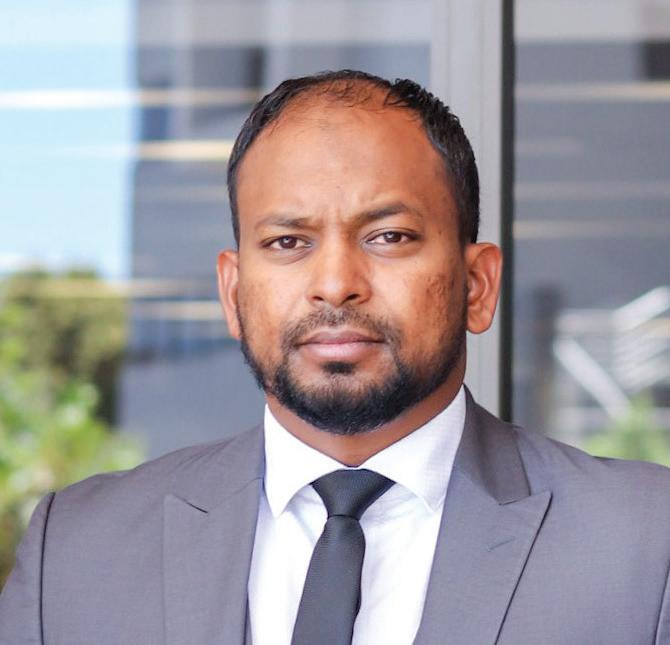
tive feedback from the public on improvements that have been made in streamlining processes and finding effective solutions.
He points out that nations like Singapore have adopted ISO standards at municipal level to great effect.
“It has benefited from standards like ISO 18091, the first ISO standard directed at the public sector, which gives guidelines for the implementation of ISO 9001 for quality management systems. This includes
a diagnostic methodology for local authorities to measure the scope and evolution of their processes and services.
“The problem in South Africa
is there [are] few [people who] understand the importance of using a risk register to optimise processes. This needs to change,” Ali says. ❖
Launched in 2009, Centurion-headquartered WWISE employs 27 full-time ISO consultants who specialise in more than 40 industries, both locally and abroad, implementing ISO standards and training programmes for a broad range of small, medium and large-scale business and organisations. It aims to uphold consistency and quality in an increasingly globalised marketplace.
Towards the end of 2019, the world experienced the COVID-19 pandemic, which resulted in a shutdown of all services in most private and public sector institutions given the health emergency that came with it. The pandemic forced most organisations, including government, to consider alternative working arrangements in order to limit human and physical interaction. This resulted in the introduction of hybrid workspaces and the working from home option that was new for most employees as only a few private companies offered this option pre-COVID-19.
The Public Service was not prepared for the work from home arrangements that came with the response levels. Due to the pandemic and subsequent regulations, the Public Service had to comply. As a result, the new work arrangements had a varied impact on the delivery of services.
As part of reflecting on the lessons from the COVID-19 period, the Public Service Commission
(PSC) conducted a study on the impact of hybrid work arrangements on service delivery in the Public Service. The study focussed on the shut-down period from March 2020 and the subsequent lockdown levels as a result of the COVID-19 pandemic. The purpose of the study was to investigate the actual and perceived impact that the introduction of hybrid work and work from home arrangements had on service delivery in the Public Service in selected departments, with a view to formulate recommendations that could assist the Public Service to adapt.
The objectives of the study were to:
establish the extent that departments used hybrid work arrangements and technology during the lockdown period and the impact of such arrangements on organisational or departmental performance;
explore the impact of hybrid work arrangements on employee wellness; determine how the hybrid work arrangements affected the recipients of public services;
assess the Public Service’s readiness to institutionalise hybrid work arrangements post COVID-19; and
make recommendations to be considered for a suitable work-arrange -
ment model in the Public Service.
The study focused on six service delivery departments and institutions – Education, Employment and Labour, Health, South African Social Security Agency, Home Affairs and South African Police Service. The information was collected through interviews, surveys and site visits. After the initial draft report was finalised, a stakeholder session was held with the participating departments and other

experts in the field to solicit the views to finalise the study.
The findings of the study suggest that existing primary legislation and policies were and are still silent on the practice of working from home or hybrid work arrangements. During the lockdown period, the gap had to be addressed through the passing of new regulations, directions and guidelines to enable departments to put measures in place to comply with the COVID-19 regulations whilst still ensuring work continuity. The study documents a combination of positive and negative practices and experiences, including notable innovative measures that were put in place by departments as well as the commitment of many employees who put their lives at risk in order to provide services to the public.
There were challenges noted with regard to the implementation of the hybrid work arrangement, including capacity constraints, additional expenses that were not budgeted for, inaccessibility of some service sites when some staff members tested positive for COVID-19, inconsistent practices in granting employees permission to work from home between and within departments and lack of appropriate tools of trade for some employees.
To ensure service delivery continuity, departments implemented interventions such as appointing additional capacity on contract basis, provision of tools of trade and allocation of alternative office space to ensure public access to services, in the event that the main buildings could not be used if there was contamination. With regard to performance management, there was no one size fits all solution for departments or units within departments. Performance was managed differently according to the different departments and in some instances it varied within the different units in the respective departments. There was also acknowledgement by some of the managers that it was a challenge to monitor employees’ performance remotely as this was a new concept in the Public Service.
When probed on the feasibility of institutionalising hybrid work post the COVID-19 lockdown periods, the SAPS and Department of Health were upfront that it would be difficult to adopt a hybrid work arrangement on a permanent basis for them because the nature of their work requires contact with service recipients. On the other hand, participants from non-essential service departments were of the view that there is a future for hybrid work arrangement in
the Public Service, provided that systems are put in place and a strong change management programme is implemented to support the new policy.
The Report makes the following recommendations:
The Department of Public Service and Administration (DPSA) should benchmark with other countries to determine how the hybrid work arrangement was managed during the pandemic and how it is being taken forward as a basis to review relevant legislation, regulations, directives, policies and conditions of service for different categories of occupations and employees.
The Public Service, led by the DPSA, National Treasury and the Department of Communications and Digital Services must take the lead in digitising government operations and prioritising access to tools of trade that will enable the effective implementation of hybrid work arrangements, where feasible.
National Treasury, in collaboration with departments such as the DPSA and Public Works and Infrastructure, must conduct a cost benefit analysis of implementing hybrid work arrangements for selected non-essential service departments in order to identify possible cost-saving measures and possible once-off cost drivers as a basis to generate resources to fund critical areas of need, including the rapid adoption of technology enabled solutions and provision of other essential services to the public.
The Report proposes that these measures be prioritised for implementation in the next 12 to 24 months. The PSC will engage the DPSA and other stakeholders regarding the recommendations and proposed timeframes.❖
Departments, in collaboration with the National School of Government, should incorporate continuous training programmes on new technologies that are necessary to facilitate remote work arrangements, online collaboration and remote access to centralised systems as well as other emerging innovations for employees to stay abreast of the new developments.
*A full report can be accessed on www.psc.gov.za under 2023 Reports.
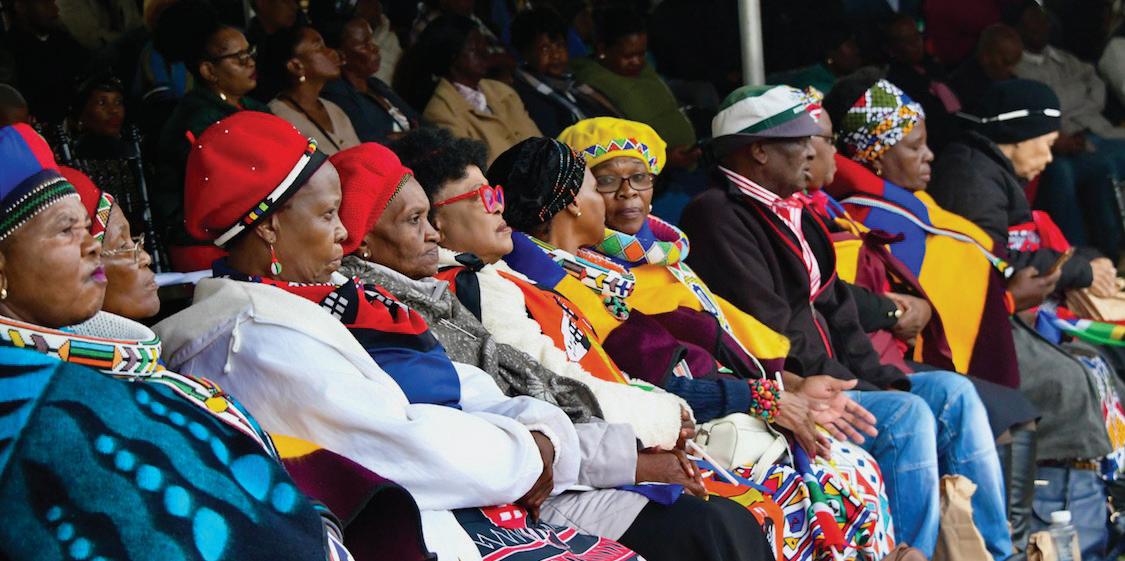
Marking the historic milestone of South Africa celebrating 30 years of democracy, government has highlighted how the South Africa of 1994 is significantly different to the South Africa of 2024, while
also emphasising that it is a better place to live in.
Addressing the launch of Freedom Month, which coincides with the celebration 30 Years of Democracy in the country, Minister in The Presidency,
Khumbudzo Ntshavheni, said
since 1994, the economy has grown significantly and government has improved the educational prospects for previously disadvantaged communities. It has also supported infrastruc -
ture development programmes and social welfare initiatives.
“In 30 years, we have achieved what few dared to dream. We know there are more hills to climb because South Africans aspire for a better future and a
prosperous South Africa. The South Africa of today is not only built by government but also built by the private sector, labour and civil society.
"The South Africa of today... is where the size of the economy has more than tripled since 1996, where the collection of revenue from our tax collectors moved from R143 billion in 1996 to over R2.1 trillion last year,” said the Minister.
Minister Ntshavheni added that the National Student Financial Aid Scheme has played an invaluable role in supporting access to higher education.
“South Africa today is a South Africa where Mam Mkhize’s children can go to a university or a tertiary institution paid for by government, without needing to apply to a Minister for permission to access a university because they were previously excluded to attend universities. South Africa today is where a young child from Soweto can dream to be a pilot or a robotics mechanic.
“The South Africa of today is where children who go to school receive three meals at school because there is a school feeding scheme, which ensures that no child goes to bed hungry,” the Minister said.
Through various initiatives like the National School Nutrition Programme, Early Childhood Development, the Sanitation Appropriate for Education initiative and the Second Chance programme for matriculants, government is working to ensure that the constitutionally guaranteed right to quality education for all is achieved.
“The South Africa of today is where the women of Bizana in the Eastern Cape know that tomorrow they will be able to trade their goods internationally because they have been supported as Small, Medium and Micro Enterprises.
“The South Africa that we celebrate embraces not only all in our diversity but acknowledges the challenges that confront us, which we together as government, business, civil society and our international partners work together to confront on a daily basis,” the Minister said.
This year marks 30 years since millions of South Africans cast their ballot in the first democratic election of 1994 for the first time in their lives.
The 30-year celebration in the country will be premised on celebrating the gains,
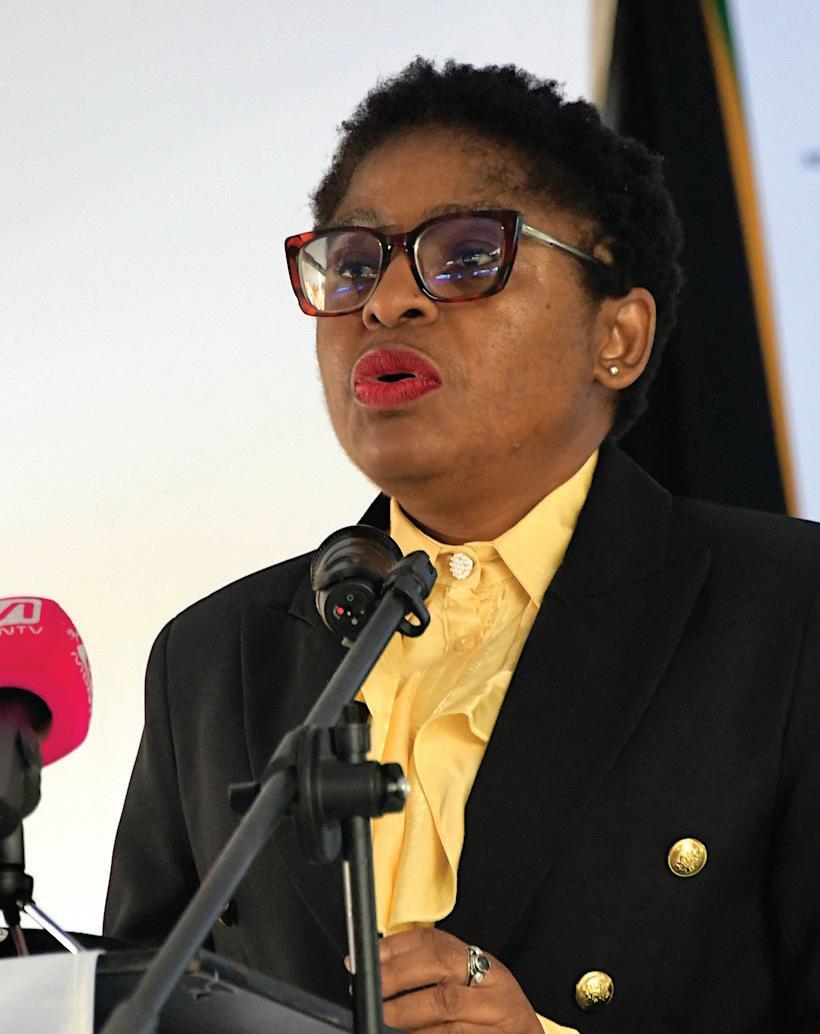
achievements, and the milestone of 30 years of democratic rule as well as living in a free and democratic society. Annually, the month of April is designated as Freedom Month in South Africa.
“As we mark these celebrations, which are going to be a year-long celebration, we are going to be telling stories of
the people of South Africa and the narrative of what government has done since 1994.
“We invite all South Africans to join in the national celebration of our 30 years. Let it be a celebration of all of us; a celebration of what we are still to achieve as we work in partnership to grow our country,” the Minister said. ❖
Source: Black African Organic Photos: Supplied by Black African Organic
Skincare is an essential aspect of maintaining a healthy and youthful appearance. As we age, our skin loses its natural elasticity, leading to wrinkles and fine lines. Additionally, the daily exposure to environmental toxins and sun damage can take a toll on the skin, leaving it dull and uneven.
To combat these issues, many people turn to skincare products that contain essential ingredients like Vitamin C and Hyaluronic Acid.
• Boosting collagen: As we grow older, collagen production decreases. Vitamin C helps to boost collagen production, resulting in firmer, more youthful-looking skin.
We recommend using Black African’s essential Vitamin C brightening gel to reduce the wrinkles and fine lines.
Price: R139.00

Neutralising harmful free radicals: One of the major benefits of Vitamin C is its ability to provide antioxidant protection. Antioxidants help to neutralise free radicals – unstable molecules that can damage the skin. Free radicals are caused by environmental toxins, sun damage, and other factors.
Vitamin C neutralises them and protects the skin

from damage, promoting a healthy, youthful appearance.
◉ Decreasing hyperpigmentation: Vitamin C is also known to help with hyperpigmentation and uneven skin tone. This is because it helps to inhibit the production of melanin – the pigment that causes dark spots on the skin. This makes products like Black African’s Vitamin C toner a
powerful tool for those looking to even out their skin tone and reduce the appearance of dark spots
Price: R139
Hyaluronic Acid is a naturally occurring substance in the body. It is known for its ability to retain moisture. It is a humectant, which means it attracts and holds onto water, keeping the skin hydrated. It helps in the following ways:
◉ Retaining moisture: this is particularly important as we age, as our skin loses its ability to retain moisture, leading to dry and dull skin. Using this product topically improves hydration, skin’s elasticity, roughness, firmness, and wrinkle appearance.
◉ Controlling oil production: beside treating mature skin, hyaluronic acid can also be used to treat oily and acneprone skin. With its ability
to soothe inflammation and regulate oil production, it is an excellent ingredient for acneprone skin.
It is not always possible to mix all powerful skincare ingredients, but Hyaluronic Acid and Vitamin C work even better together. In anti-aging formulations, these ingredients can produce both immediate and long-lasting results.
According to research, Vitamin C ( also known as L-ascorbic acid) and Hyaluronic Acid, when
combined in a serum, resulted in reduced wrinkles, increased skin brightness and left participants’ skin more hydrated.
The two products provide antioxidant protection and hydration, resulting in a more flawlesslooking skin. Incorporating these essential ingredients using Black African’s skincare line into your skincare routine can help you achieve your desired skin goals in no time.
◉ When applying them separately, start with the Vitamin
C serum. After leaving the product on the skin for a few minutes, Hyaluronic Acid helps keep the product in place while also providing additional moisture to keep the skin moist.
◉ It is important to note that when using these ingredients, it is best to use them in the correct formulation and at the correct concentration for the best results.
Hyaluronic Acid Renewal kit. Apart from having the perfect concentration, the kit has all the variety of products that can easily fit into your skincare routine.
Price: R469.00

◉ If you want to save yourself from the hassle of applying them separately, we recommend the Black African Organics Vitamin C and * Black African Organics is an award-winning cosmetic manufacturing company and natural beauty brand. We harness ancient African tradition with modern science, to deliver ground breaking results for African skin and hair. Established in 2015, Black African Organics was born out of the mission to empower African women to embrace their natural selves and feel confident in their skin.

For more information, visit: https://www.blackafrican. co.za/ or follow us on Facebook @Black African Organics, Instagram @ blackafricanorganics and LinkedIn: Black African Organics (Pty) Ltd
South African food and culinary history is an integral part of the country’s heritage, diversity and tradition.
In this edition, we feature a recipe by Chef Nosiphiwe Mbhele – a graduate of the National Youth Chef’s Training Programme (NYCTP).
The programme was established through a partnership between the National Department of Tourism and South African Chefs Association to address the need for cooks and chefs in South Africa’s hospitality industry. It aims to equip young, unemployed people with skills to become chefs.
Mbhele’s recipe was featured in the department’s #MaSisulu100 Cookbook – unique culinary collection of recipes compiled by beneficiaries of the NYCTP.
Loin lamb chops and mini beef wors skewers:
2 portions of 140 g loin lamb.
Chops (marinated in rose mary, garlic and oil).
2 portions of 120 g mini beef wors.
Chakalaka: 90 ml cooking oil.
2 medium onions (chopped).
2 carrots (peeled and grated).
1 tablespoon of paprika.

3 red, yellow and green bell peppers (diced).
100 ml tomato puree.
1 tablespoon of mild curry powder.
1 tablespoon of garlic (chopped).
4 hot chili peppers.
½ teaspoon of turmeric powder.
“I hope this dish will bring friends and family together, and inspire many memorable moments,” said Mbhele.
Braised spinach and mushroom:
750 g spinach (washed and chopped).
200 g button mushrooms (chopped).
1 tablespoon of cooking oil.
1 tablespoon of garlic (finely chopped).
1 teaspoon of salt.
Urban chip pap:
250 g maize meal.
1 litre of water.
1 teaspoon of salt to season.
2 eggs.
200 ml cooking oil.
250 g cake flour.
Onion rings:
1 medium onion (cut into medium rings).
250 ml cake flour (season with preferred spice)
250 ml water.
1 teaspoon of baking powder.
200 ml cooking oil.
Loin lamb chops and mini beef wors skewers:
Marinade: chop rosemary and mix with crushed garlic and olive oil in a bowl.
Immense lamb chops and refrigerate for minimum of 30 minutes to four hours.
Heat up a heavy-duty frying pan until hot, place the lamb chops and seal on both sides (minimum of three minutes per side), or as desired.
Set aside to rest covered with foil.
Insert skewers through the mini beef wors to make it easier to work with.
Place in a shallow frying pan with water and braise until firm.

Once firm, remove water, add oil and brown the mini beef wors.
Chakalaka:
In a large saucepan, heat oil and sauté onions, peppers, chilies, garlic, grated carrots until soft.
Add curry powder, turmeric and paprika and stir continuously for three minutes.
Lastly, add tomato puree, allow to cook for two minutes, and season with salt and pepper.
Remove from heat and allow to cool. Serve at room temperature.
Onion rings:
Mix all dry ingredients and add the water to form a thick batter. In a large saucepan, heat oil to fry onions.
Deep onion rings into the batter and fry in the saucepan until golden.
Transfer onion rings on paper towel to remove excess oil.
Braised spinach and mushroom:
In a large saucepan, heat oil and sauté onions, mushrooms, and garlic until soft.
Add spinach and cook until wilted and soft, but still bright green.
Add salt to season and remove from heat to use later.
Urban chip pap:
Bring 700 ml of water to a boil in a pot, and mix the remaining 300 ml with the maize in a bowl to a paste.
Add the maize paste to the boiling water, stirring continuously to prevent lumps.
Reduce the heat and simmer for 25 minutes stirring occasionally to prevent the base from burning.
Grease a baking tray with butter and transfer the pap onto the tray.
Level the pap onto the tray and allow to cool. Once cooled, cut pap to the desired strips.
Beat egg in bowl.
Season flour with spice of choice.
Dip pap in egg and then in flour and fry until golden.
You can serve this meal by assembling the portions on a board of platter and garnish with micro herbs and chili flakes.

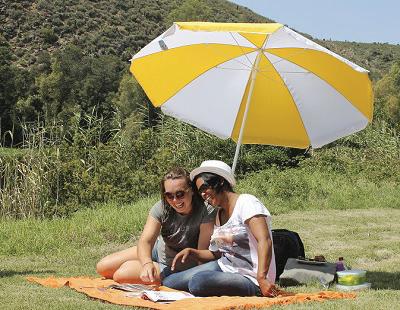



Mountain views and sprawling nature is the backdrop to your family fun at Bontebok National Park.
Bontebok National Park, situated approximately two hours from Cape Town, has all the makings of a fun-filled family vacation or quick weekend break. Here’s a few reasons why:
⦿ Swimming and canoeing in the Breede River
Take a dive or paddle in the Breede River, which can be accessed from either the Rest Camp area or at Die Stroom.
⦿ Take the Nature Trail
Take the kids away from the iPads, leave technology behind and connect with what truly matters – time with each other and nature. There are three nature trails that start and end in the Rest Camp area.
⦿ See the park from a mountain bike
The park offers numerous trails where mountain bikers can hit the dirt, as animals do not pose a safety threat in this park. Alternatively, cycle along the tourist roads.
⦿ Explore the historic town of Swellendam Swellendam, the third-oldest town in South Africa, lies just 5 km away from the park. This picturesque town offers plenty of attractions, including a host of national monuments, galleries and numerous eateries and pubs.
⦿ Picnic on the banks of the Breede River
Whether you are staying the night or visiting for the day – enjoy some time out on the banks of the Breede River with friends and family and use the designated braai and picnic areas. Full ablution facilities are available at these sites.
⦿ Go on a game drive
Bontebok National Park was originally established to conserve a species – its namesake, the Bontebok. Go game viewing in search of these beautiful creatures from your own vehicle along a circular route, which includes three viewpoints with stunning views of the Breede River, the Old Racecourse and surrounding countryside. ❖

